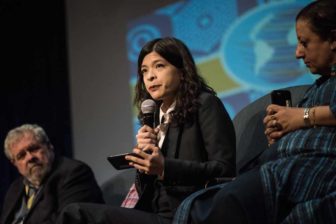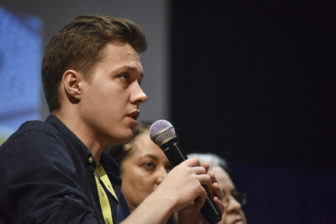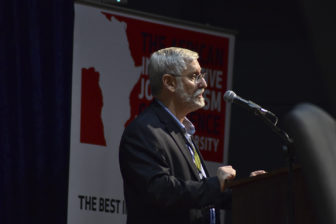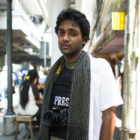
David Cay Johnston (left), Patricia Evangelista, and Ritu Sarin (right) share their experiences during the plenary session at the 10th Global Investigative Journalism Conference. Picture: Daylin Paul
Russian version here. Русская версия здесь.
“Once upon a time – which is the only good and proper way to begin a story – there was a mother and a father who lived in a cinder block house with their six children in the slums.”
More than 1 200 journalists from over 130 countries sat hushed in a hall in Johannesburg, South Africa, this morning, immersed in a story told by Filipino multimedia journalist Patricia Evangelista at the plenary session of the Global Investigative Journalism Conference 2017.
“One day the police came and arrested the mother. When the father found out, he ran away, because he knew that the police would come back and kill him. They said that they were drug dealers. He came back anyway, because it was the birthday of one of his children. So that morning they ate breakfast, and they were happy and they were laughing, and he told all of his six children to take care of each other, because papa would have to go away again.
“Then there was shouting outside and three gun barrels through the window. The police kicked open the door and they pushed the father into the couch, head down, knees on the cushion.
“And then they told all the children to get out of the house. Except for one. Because the 12-year old threw herself beside her father, grabbed (sic) her arms around him, and wouldn’t let go.
“She said she was there when they shot her father. Shot him through the back of his head, shot him through the chest. Shot him so close that the next day her little brother pulled the bullet from the back of the couch.
“It took a long time for the girl to start talking again. When she did, she apologized. She said sorry to her siblings and she said sorry to her grandmother. She said sorry because it was her fault. Had she held her father tighter, had she hugged him harder, papa wouldn’t be dead.”
Evangelista shared the experience of a single family that fell victim to the systematic killings of drug users endorsed by the Philippine’s President Rodrigo Duterte.

Novaya Gazeta’s Roman Anin. Photo: Daylin Paul
Investigative journalists from India, Russia, the US, South Africa and Venezuela on the morning’s panel shared their realities of working around the world. Roman Anin, an editor at Russia’s Novaya Gazeta, spoke of a colleague being shot to death. Thanduxolo Jika, a senior investigative journalist at South Africa’s Sunday Times, spoke of a “systematic and deliberate breaking down of government, where looting is made normal, where people go unpunished”. Venezuelan veteran investigator Ewald Scharfenberg said his government is currently suing him for “defamation”, with a possible jail sentence of six years. “The outcome of this trial is already made – the judge has never ruled against the government in 20 years,” he said.
The plenary panel was moderated by Ferial Haffajee, editor-at-large at Huffington Post South Africa, and editor-in-chief at the African National Centres for Investigative Reporting (ANCIR). Also on the panel was Ritu Sarin, an executive editor at Indian Express.
Several countries in the world face a new brand of autocracy, said Scharfenberg. “It’s not about physical attacks, kidnapping journalists, seizing media outlets or shutting them down,” he said. “It’s more about controlling minds … Hard social re-engineering; pushing for a unique truth that is the only one that can be spread.”

David Kaplan, executive director of GIJN. Photo: Daylin Paul
David Kaplan, the executive director of the Global Investigative Journalism Network, said: “Something extraordinary is going on. We’re facing a global backlash against the things that we hold dear: transparency, a free and independent news media, the ability to hold our … leaders in our society accountable.”
But this, he said, is what has brought a record number of journalists together for #GIJC17. “We’re the backlash against the backlash.”
News makers will spend the next four days gleaning practical tips from their colleagues and honing their craft at the hands of world-class mentors. In a sense, they’ll be strengthening the backlash; learning to better do what Johnston describes as the only thing they can.
“If the tsunami is coming you can hold your hand up, but it’s just going to run over you; it has to expend its energy,” he said. “What we can do, what we should do, what we must do, is document all this as thoroughly as we can – so that the human spirit does not dwindle but is ennobled and enabled to grow.”
 Thalia Holmes is a South African freelance journalist specializing in business, health and long-form feature writing. She has won various national awards for her work. Previously she worked at the Mail & Guardian as a business reporter, and was a management consultant in a former life before finding her passion in media.
Thalia Holmes is a South African freelance journalist specializing in business, health and long-form feature writing. She has won various national awards for her work. Previously she worked at the Mail & Guardian as a business reporter, and was a management consultant in a former life before finding her passion in media.
 Daylin Paul is an independent photographer, visual journalist and photojournalism educator based in Johannesburg, South Africa. He is the 2017 winner of the prestigious Ernest Cole Award for Photography for his ongoing documentary Broken Land and the 2017 Hostwriter Pitch Prize for Collaborative Journalism. His work has appeared in The New York Times, The Guardian, Foreign Policy, Financial Times and Huffington Post. He is a trainer in the Photojournalism and Documentary Photography program at the Market Photo Workshop, a picture editor at The Con Mag and a freelance writer for the Mail and Guardian.
Daylin Paul is an independent photographer, visual journalist and photojournalism educator based in Johannesburg, South Africa. He is the 2017 winner of the prestigious Ernest Cole Award for Photography for his ongoing documentary Broken Land and the 2017 Hostwriter Pitch Prize for Collaborative Journalism. His work has appeared in The New York Times, The Guardian, Foreign Policy, Financial Times and Huffington Post. He is a trainer in the Photojournalism and Documentary Photography program at the Market Photo Workshop, a picture editor at The Con Mag and a freelance writer for the Mail and Guardian.
